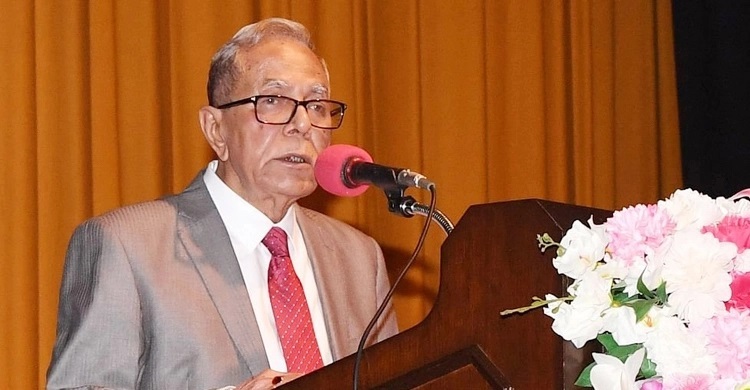President for minimizing skill gaps for 4th industrial revolution

President M Abdul Hamid on Friday asked all concerned authorities to redesign the country's higher education system for minimizing skill gaps as preparedness for upcoming industrial revolution.
"We need to identify the skill gaps and redesign the higher education system rapidly to cope with the global competition," the President said as he virtually opened a two-day 'International Conference on the 4th Industrial Revolution and Beyond (IC4IR) - 2021' at Bangabandhu International Conference Centre (BICC) here.
He expected that the conference would draw experts' suggestions and recommendations for the universities to produce skilled manpower to meet domestic and global job market demand.
Addressing the event from Bangabhaban, the President said the universities have to strengthen the academia-industry linkage as the incumbent government in the meantime enhanced budget for research and innovation.
"Although we are doing increasingly better in agriculture, automation, software development, freelancing and many other sectors, we have to put more emphasis on the university rankings in the international context," Abdul Hamid suggested.
He thanked the UGC authority and other relevant stakeholders for arranging a two-day IC4RB-2021 as part of the two historic mega events - Bangabandhu's birth centenary and Bangladesh Independence's Golden Jubilee celebrations.
In line with Bangabandhu's dream of a 'Sonar Bangla' - a hunger and corruption free, prosperous Bangladesh, Abdul Hamid said, "Bearing the same philosophy in mind at present, Bangabandhu's dream has been transformed into 'Digital Bangladesh' under the visionary leadership of Prime Minister Sheikh Hasina and her ICT Adviser Sajeeb Wajed Joy."
President Abdul Hamid called upon all to join hands with everyone to embrace the 4IR or Industry 4.0 robustly as "It is now the reality and we can't deny it any more. It is the time to change the whole landscape of how we do feel, how we do work, how we do live, how we do travel . . . and so on."
The first revolution is all about steam engine, the second revolution is about electricity, the third is about internet and computer and the 4IR added Intelligence to the third Industrial Revolution and changed the whole scenario while the 4IR comes up with new challenges replacing traditional jobs with automation, the President mentioned.
He said the Artificial Intelligence is being used for predicting business futures, robots are being used in the garments industry and shopping centers, Machine Learning is being used for simulation and Internet of Things (IoT) are being used in smart agriculture.
The 5G technology is completely changing the business model and many other instances do exist around the world, the head of the state added.
Referring to the inclusive development of Bangladesh through connecting high- tech, low-tech and no-tech people countrywide, he said, "We have already shifted from the traditional face-to-face education to blended, online and digital education . . . We should not go back but rather we have to capitalize on what we have and advance rapidly."
The President also expressed grave concern over the unemployment rate amongst the graduates due to the mismatches of skills and foreigners are dominating domestic job market, especially in the technical and managerial levels, corporate firms, and multi-national companies.
"This trend leads to substantial remittance outflow from Bangladesh," he observed, adding, "We must adapt to the changes of 4th industrial revolution."
Noting that Bangladesh is the 93rd largest country in terms of land mass but in terms of population it is the 8th largest country in the world, the President said, "We have a good advantage over the developed world with huge working population (age 15-64 years). With the advent of 4IR many will lose their jobs but more new jobs will be created."
Abdul Hamid stressed the need for transforming this huge population into a well- trained and skilled workforce equipped for the 4IR to strengthen country's ongoing socio-economic development trend as Bangladesh has become a middle-income country and aspires to reach a developed one by 2041.
Education Minister Dr Dipu Moni, MP, Deputy Minister for Education Mohibul Hassan Chowdhoury, MP, and University Grants Commission (UGC) Chairman Prof Kazi Shahidullah, among others, spoke there.
Source: BSS



